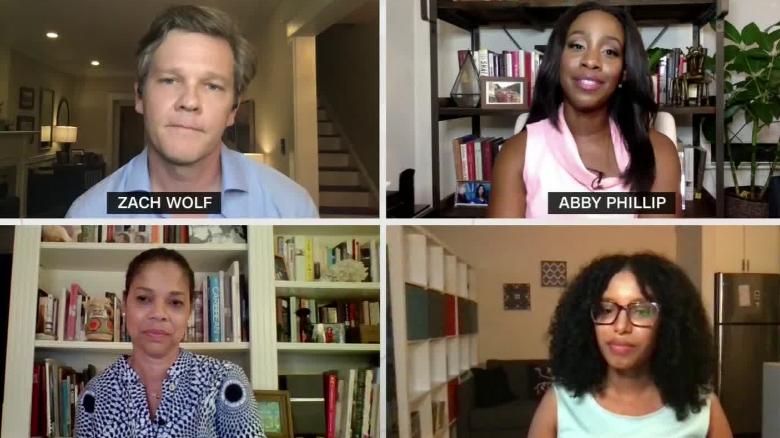A version of this story appeared in CNN's What Matters newsletter. To get it in your inbox, sign up for free here.
(CNN)A lot of people have concerns about mail-in voting (is the Postal Service being sabotaged? Will their vote be counted?), and also about the state of American democracy in general.
Voting by mail is actually very secure, despite what the President says. However, if people don't trust that their votes will be counted, that's a full-blown crisis of democracy. With millions of Americans turning to mail-in voting, many for the first time, because of the coronavirus pandemic, that means doubts about the ability of the USPS to deliver mail equal doubts about the election.
Vote early! On Friday, we learned USPS has notified states that some mail-in ballots are at risk of not being counted.
Multiple states received communications from the USPS general counsel outlining standard mail delivery times and prices leading up to the November election and warning secretaries of state that election laws established by the states would not necessarily guarantee that mail-in ballots will be received in time to be counted.
CNN obtained letters sent to Washington, Pennsylvania, California and North Carolina. The Utah lieutenant governor's office also confirmed to CNN that it received a letter at the end of July. The Washington Post reported 46 states and Washington, DC, all received similar warnings.
USPS General Counsel Thomas Marshall wrote to California's secretary of state that there is "a significant risk that some ballots will not be returned by mail in time to be counted under your laws as we understand them."
The letters suggest election mail be sent by first class mail, at a higher rate than the nonprofit rate most states use, an obstacle for cash-strapped states dealing with the pandemic.
The slowdown. Meanwhile, in a Pennsylvania court filing, it was alleged that slower USPS delivery times are a likely outcome of recent changes put in place by the post office that have been criticized for putting at risk the ability to conduct vote by mail across the country.
Pennsylvania may extend its deadline to receive ballots to up to three days after the election, provided they are mailed by Election Day.
See below for more on deadlines, but just remember not to wait 'til the last minute to vote by mail. And if you want to know how to get an absentee ballot, there are links below
The USPS crisis is not just about ballots. The saddest mail story you'll read today has to do with a neighborhood in Southeast Washington, DC, where they aren't getting mail at all.
Knee-capping the mail. Former President Barack Obama, appearing on a podcast, accused President Donald Trump of trying "starve" the postal service.
"What we've seen in a way that is unique to modern political history is a President who is explicit in trying to discourage people from voting," Obama said. "What we've never seen before is a President say, 'I'm going to try to actively kneecap the postal service to encourage voting and I will be explicit about the reason I'm doing it.'"
"That's sort of unheard of," he said.
After saying on Thursday on Fox News he was intentionally withholding money from USPS because of voting, Trump seemed to change his tune Friday.
At a press conference in Washington, Trump said he would give the Postal Service money it has requested to maintain operations as part of a stimulus bill, but said Democrats must do more to trim the support they want to give state governments in that bill.
How to make sure your mail-in vote is counted
What's clear is that a whole lot more Americans will be allowed to vote by mail this year -- 76% of the country, according to the New York Times. In the time of Covid, we can assume a lot more people are going to make use of it.
But it will take some planning and a little more work from you, the voter. We'll update this as needed, but here's a guide to making sure your mail-in vote is counted.
Figure out what's going on in your state
The election is still a while off, but it's not too early to see what's going on in your state in terms of mail-in voting.
The first mail-in ballots to be sent this year will be in North Carolina, on September 4. But voters there can request a mail-in absentee ballot until October 27. (Election Day is November 3.)
You have to go check your local secretary of state or board of elections website. Google will be valuable here. Or, there are a number of organizations that have lists of every single Secretary of State website.
Here's one run by the US government at USA.gov.
Here's one from the group representUS, which advocates for mail-in voting, and is a little more user friendly. I took some specifics about deadlines listed below from their spreadsheet.
That's the thing. Every state is a little bit different.
Get a mail-in ballot
A number of states -- the entire West Coast, DC and a few others -- send mail-in ballots to every voter.
Most other states require a voter to apply for a mail-in ballot. Some of them require an excuse, like a medical condition, jury duty, temporarily residing outside the district for military duty or school, etc. You just have to check. During Covid, it seems like almost anyone could argue the medical condition, but check. Just check.
Many states that require an application to get an absentee ballot make it a pretty easy online process, although those websites are not all yet online.
But some of them require you to download the application and email it, mail it in, or drop it off at a government office.
In South Dakota, for instance, you don't need an excuse. But you will need to include a copy of your driver's license.
Many states, including South Dakota, have or will mail applications for absentee ballots to their entire voter file.
In my state, Virginia, there is an online form and you just provide your driver's license number and verify that the signature on your diver's license can be used to verify your ballot.
Again, every state is a little bit different.
Mark your calendar
Most states, according to the database at representUS, require an absentee ballot to be requested by mid-to-late October. Some of them allow a request to be filed up until the day before Election Day.
But seriously, what are you waiting for?
If you wait 'til the last minute, you might be better off voting in person, if that's available to you, especially if you don't leave enough time for the mail-in ballot to get to you and then back to your local officials. You saw the stuff above, right? There are allegations the mail is actually being slowed down at this time so there will be fewer votes.
Track your ballot
Most states, with help from USPS, give your ballot a code. After you've requested it, you can go to the Secretary of State's website and see where you are in the process.
It looks sort of like ordering a pizza from Domino's and being able to see on your phone when it comes out of the oven. Or filing your taxes! The federal government notifies you about that, too.
But not all states offer this feature. And they're not all Southern states opposed to mail-in voting you might suspect. You might expect Texas to require an excuse for voting by mail and not offer a tracking system. But New York also requires an excuse and also does not track your ballot. Connecticut is an example of a Northeast state temporarily allowing absentee voting by mail, although they do not track your ballot.
If it doesn't arrive, you might want to head to your polling place and explore your options, which are probably filling out a provisional ballot.
Don't wait
The underlying warning of the USPS letters to states is that ballots mailed late may not be delivered in time to be counted under state law.
Some states count ballots received on Election Day.
Some states count ballots received at a certain time on Election Day:
- 6 p.m. in Kentucky!
- 7 p.m in Colorado!
- 8 p.m. in Delaware!
Some states count ballots postmarked on Election Day, but received within a certain number of days:
- 2 days in Connecticut!
- 10 days in Maryland!
- 14 days in Illinois!
It's up to you
This year, more than any other in recent history, because of the pandemic the onus is going to be on the voter make sure they're able to vote.
While states are making provisions to help people vote by mail and absentee, that's clearly a process that's more complicated than just showing up on Election Day. And it's going to be a little bit different for everyone, depending on where you live.
But whatever you do, if you plan on voting any way other than at a polling place, start figuring out the process now. It can't hurt.




















